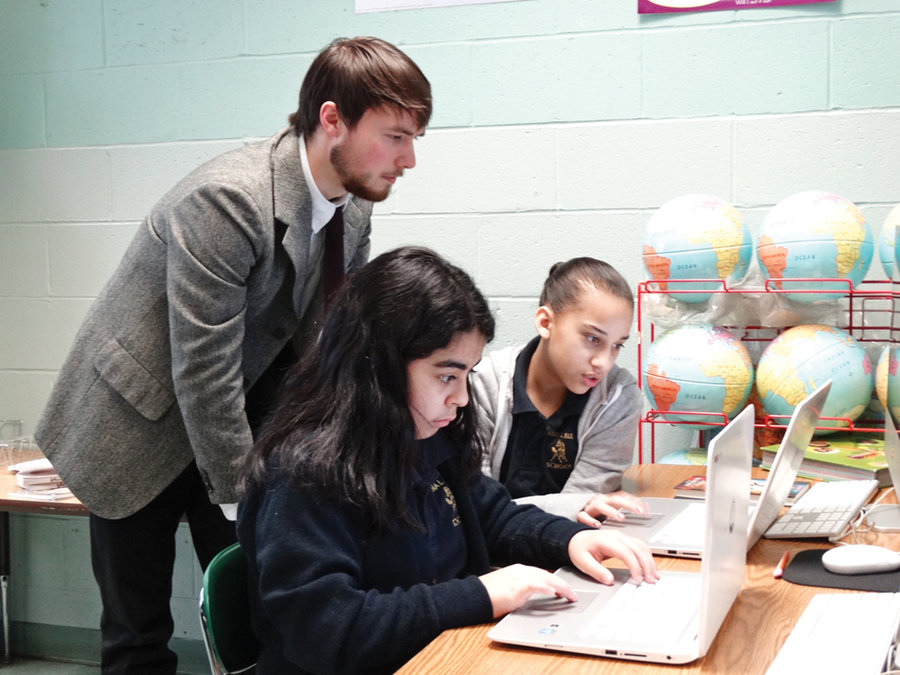The fifth grade students in teacher Andrew Gallagher’s social studies and language arts class have graduated from paper to computers. On a recent wintry morning, they were all racing around the Internet, compiling information to support argumentative essays on topics such as whether school uniforms should be required, or if the death penalty should be illegal.
Collaborators Venizzo Valenciano and Angel Chicas, both 10, had chosen as their topic the question of “Tablets vs. Textbooks: Which is Better?”
“Tablets,” said Angel. “With paper you have to spend more time on homework. It’s easier to do it on tablets so you can spend more time studying.”
Venizzo agreed, adding, “Say you have a textbook for every subject and we have a lot of homework, you have to carry a lot of books. It can make you have injuries. Too much weight on your back,” he said. “And then also tablets are saving the environment because they’re preventing from cutting more trees down.”
Chrome engagement
This year the Anna L. Klein School took advantage of a grant to purchase 300 Chromebook computers for student use. Chromebooks are essentially small, inexpensive laptops with limited internal storage and a robust web browser that uses the Google Chrome operating system.
Every student in grades 5 and 6 was given one, which allows them access to Google Classroom.
“Google Classroom works almost like a Twitter feed, but it only goes to my students,” said Gallagher, explaining that he can post a document and distribute it to everyone in the classroom with a click. “I’ve made photocopies maybe three times this year.”
But that’s just the beginning. Gallagher has the ability to view in real time what any of his students is up to, allowing him to help guide them early in the process, rather than waiting until an assignment is complete and simply grading the finished product.
“And that’s really cool for a long-term assignment like this because I can look at all kids’ essays and see, oh this kid didn’t do anything today, this kid is doing awesome. While they’re working I can make a comment and say ‘great job, think about this, rephrase this.’ It’s useful for giving comments throughout the process that I normally wouldn’t do if it was on paper.”
“Student engagement is ten times what it used to be. If I was doing this exact same project but they didn’t have Chromebooks, they’d be talking a lot more about off-topic things.” –Andrew Rosenberg
____________
In addition, with tests given online, Gallagher can grade more quickly and efficiently, highlighting and adding comments as appropriate.
“It’s so much easier,” he said. “And so much more interactive. On top of that, student engagement is ten times what it used to be. If I was doing this exact same project but they didn’t have Chromebooks, they’d be talking a lot more about off-topic things.”
New computers, new skills
The class spends half a day with Gallagher before switching to another teacher, Flavia Rios, for the afternoon. Rios teaches math and science, also using the Chromebooks.
Students each retain their own Chromebook for the year, although they cannot take them home. At least not yet.
One reason the units are not allowed outside is because of issues with keeping them charged. Currently they are charged in school. Far more significant, though, is the question of loss or damage to the Chromebooks.
“We need them to administer the PARCC exam, which is coming up in a month,” explained Superintendent Michelle Rosenberg.
The PARCC (Partnership for Assessment of Readiness for College and Careers) assessment is a government mandated, computer-based test that all students in grades K-12 are now required to take. The Chromebooks not only provide the ability for students to take those tests, they offer the ability to prepare the kids on the logistics of computer testing.
“When we found out about PARCC, one of our biggest concerns was that the students need to master the skills necessary to do well on the test,” said Rosenberg. For students without regular access to a computer, that meant bringing them up to speed on the basics, including drag-and-drop and simple typing skills.
Also, according to Rosenberg, “One of the big things on the PARCC exam is citing evidence from the text. So in this project [Gallagher] has forced them to cut and paste but then they’re going to have to cite their sources.”
“I think they’re going to be more prepared for the standardized tests that the state has mandated,” she concluded.
Each Chromebook has its own data plan, just like a smart phone, so students don’t need to access the WiFi in the school and potentially slow down the network. If the students are eventually allowed to bring home the Chromebooks, this will allow them to access the Internet anywhere at any time.
But even without taking the computers home, students can already access their files remotely. “They can all access Google drive and log in with any computer that has Internet access,” said Gallagher. “So say they have an essay due and they want to finish it in the library, they can go to Google Drive, type it in, and all their files from my class are there.”
“The best part is I was sick at home and Mr. Gallagher sent this [assignment] home,” said Lia Fuentes, 11. “I actually started doing it at home. I was at school but still at home. You can be home or anywhere and you have your work right there.”
Art Schwartz may be reached at arts@hudsonreporter.com.
